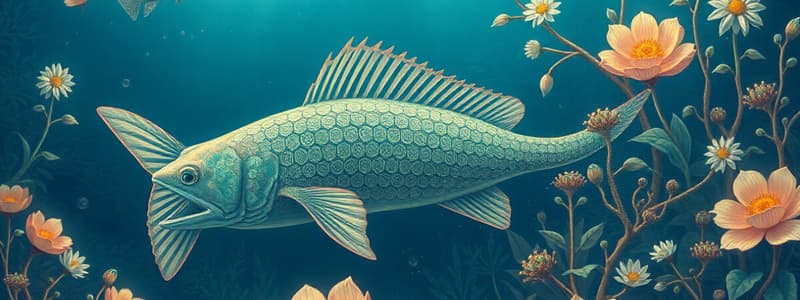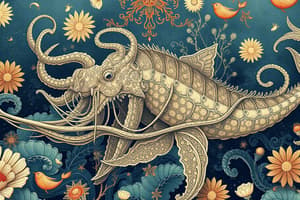Podcast
Questions and Answers
What is the primary purpose of upwelling in ocean currents?
What is the primary purpose of upwelling in ocean currents?
- To transport pollutants to deeper ocean layers
- To bring deep nutrient-rich water to the surface (correct)
- To decrease marine life distribution
- To lower the surface temperature of the ocean
Which of the following human activities is NOT a direct cause of marine pollution?
Which of the following human activities is NOT a direct cause of marine pollution?
- Fertilizer runoff
- Overfishing (correct)
- Plastic waste
- Oil spills
What significant impact does climate change have on marine environments?
What significant impact does climate change have on marine environments?
- Promotes upwelling events
- Enhances local fish populations
- Acidifies ocean water and alters temperatures (correct)
- Increases marine biodiversity
Which strategy is primarily employed in marine conservation efforts?
Which strategy is primarily employed in marine conservation efforts?
Why is it important to understand human impacts on marine environments?
Why is it important to understand human impacts on marine environments?
What role do phytoplankton play in marine ecosystems?
What role do phytoplankton play in marine ecosystems?
Which factors are crucial for the health of a marine ecosystem?
Which factors are crucial for the health of a marine ecosystem?
What is a significant adaptation that marine organisms exhibit?
What is a significant adaptation that marine organisms exhibit?
In what way do zooplankton contribute to marine food webs?
In what way do zooplankton contribute to marine food webs?
How do marine mammals differ from other marine organisms?
How do marine mammals differ from other marine organisms?
What are the primary components that make up coral reefs?
What are the primary components that make up coral reefs?
What is a major threat to coral reef health?
What is a major threat to coral reef health?
Which characteristic defines invertebrates in marine ecosystems?
Which characteristic defines invertebrates in marine ecosystems?
Flashcards
What is marine biology?
What is marine biology?
The study of marine organisms and their interactions with the environment, including all aspects of marine life, from microscopic plankton to large whales.
What are marine ecosystems?
What are marine ecosystems?
A diverse range of habitats, including oceans, seas, estuaries, coral reefs, and coastal wetlands, characterized by interconnected food webs and factors like sunlight penetration, water temperature, salinity, and nutrient availability.
What are marine organisms?
What are marine organisms?
Organisms with specialized structures, behaviors, and physiological processes adapted to their marine environments. They include phytoplankton, zooplankton, fish, marine mammals, and invertebrates.
What are phytoplankton?
What are phytoplankton?
Signup and view all the flashcards
What are zooplankton?
What are zooplankton?
Signup and view all the flashcards
What are fish?
What are fish?
Signup and view all the flashcards
What are marine mammals?
What are marine mammals?
Signup and view all the flashcards
What are invertebrates?
What are invertebrates?
Signup and view all the flashcards
What is Upwelling?
What is Upwelling?
Signup and view all the flashcards
What is Marine Pollution?
What is Marine Pollution?
Signup and view all the flashcards
How do humans impact the ocean?
How do humans impact the ocean?
Signup and view all the flashcards
What are Marine Conservation efforts?
What are Marine Conservation efforts?
Signup and view all the flashcards
Why are ocean studies important?
Why are ocean studies important?
Signup and view all the flashcards
Study Notes
Introduction to Marine Biology
- Marine biology is the study of marine organisms and their interactions with the environment.
- This includes all aspects of marine life, from microscopic plankton to large whales.
Marine Ecosystems
- Marine ecosystems encompass a wide range of habitats, including oceans, seas, estuaries, coral reefs, and coastal wetlands.
- These environments are characterized by diverse and interconnected food webs.
- Important factors contributing to ecosystem health include sunlight penetration, water temperature, salinity, and nutrient availability.
Marine Organisms
- Marine organisms exhibit a remarkable range of adaptations to their environments.
- Adaptations can include specialized structures, behaviors, and physiological processes.
- Examples of marine organisms include phytoplankton, zooplankton, fish, marine mammals, and invertebrates.
Phytoplankton
- Important primary producers in the marine food web.
- Phytoplankton are microscopic algae and photosynthetic bacteria.
- Photosynthesis is the primary means for them to produce energy.
- They form the base of many marine food chains.
Zooplankton
- Zooplankton are small, drifting animals that feed on phytoplankton.
- Many different types of zooplankton exist, from microscopic copepods to jellyfish.
- They serve as a crucial link between primary producers and higher trophic levels.
Fish
- Fish are vertebrates that live in the ocean.
- They exhibit a wide variety of shapes, sizes, and behaviors.
- Fish are important predators in many marine ecosystems.
- Adaptation to their environment is significant in the variation of fish species.
Marine Mammals
- Marine mammals include whales, dolphins, seals, and sea otters.
- These animals are adapted to both land and marine environments.
- Many species are at risk due to human activity (pollution, overfishing, habitat destruction).
- Some types of marine mammals have evolved to a fully aquatic lifestyle.
Invertebrates
- Invertebrates include a wide variety of animals without backbones.
- This group includes corals, shellfish, sea stars, and many other organisms.
- Invertebrates play a vital role in many marine ecosystems.
Coral Reefs
- Coral reefs are highly diverse ecosystems formed by coral polyps.
- They provide habitat for many marine organisms.
- Coral reefs are sensitive to environmental changes and degradation.
- Overfishing, rising ocean temperatures (causing bleaching) can greatly affect the structure of coral reefs.
Ocean Currents and Circulation
- Ocean currents move water throughout the world's oceans.
- Currents have a major effect on marine life distribution and nutrient transport.
- Upwelling is a process that brings deep nutrient-rich water to the surface, promoting primary production in surface waters.
Marine Pollution
- Human activities cause marine pollution, impacting marine life and ecosystems.
- Plastics, chemicals, and sewage are a major threat to marine organisms.
- Pollution can directly impact organisms by causing harm or death.
- By understanding the causes of marine pollution, we can develop plans to better maintain and protect the health of the ocean.
Human Impact on Marine Environments
- Overfishing and habitat destruction threaten many marine species.
- Climate change is altering ocean temperatures and acidifying the water, harming marine organisms.
- Pollution (oil spills, plastic waste) is a major contributor to marine ecosystem degradation.
- Understanding human impacts is essential for developing sustainable marine resource management strategies.
Marine Conservation
- Conservation efforts aim to protect and restore marine ecosystems.
- This includes creating marine protected areas, managing fisheries sustainably, and reducing pollution.
- Conservation strategies are designed to minimize human impact on delicate marine environments.
- Conservation efforts also involve community engagement, as the health of the marine environment is a shared responsibility.
Studying That Suits You
Use AI to generate personalized quizzes and flashcards to suit your learning preferences.




